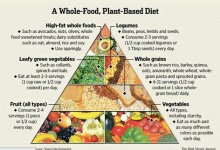SearchingforPeace
Well-known member
- Joined
- Jun 9, 2015
- Messages
- 5,714
- MBTI Type
- ENFJ
- Enneagram
- 9w8
- Instinctual Variant
- sx/so
The sugar conspiracy | Ian Leslie | Society | The Guardian
Interesting article on low fat vs low carb diets and the political fights that caused the massive spread of diabetes.
The article is very clear on the cause and consequences. Read the whole thing.
There is one section of the article I found fascinating, about how scientific consensus develops: the old guys die off.
Back to the topic
Read the whole thing. It is very long, but useful not only for health but also for the problem with consensus science.....
The only thing it could discuss more is the role of the food industry in all this. .....
Interesting article on low fat vs low carb diets and the political fights that caused the massive spread of diabetes.
The article is very clear on the cause and consequences. Read the whole thing.
John Yudkin, said the scientist, was a British professor of nutrition who had sounded the alarm on sugar back in 1972, in a book called Pure, White, and Deadly.
“If only a small fraction of what we know about the effects of sugar were to be revealed in relation to any other material used as a food additive,†wrote Yudkin, “that material would promptly be banned.†The book did well, but Yudkin paid a high price for it. Prominent nutritionists combined with the food industry to destroy his reputation, and his career never recovered. He died, in 1995, a disappointed, largely forgotten man.
....
But by the time he wrote his book, the commanding heights of the field had been seized by proponents of the fat hypothesis. Yudkin found himself fighting a rearguard action, and he was defeated.
...
In 1980, after long consultation with some of America’s most senior nutrition scientists, the US government issued its first Dietary Guidelines. The guidelines shaped the diets of hundreds of millions of people. Doctors base their advice on them, food companies develop products to comply with them. Their influence extends beyond the US. In 1983, the UK government issued advice that closely followed the American example.
...
Look at a graph of postwar obesity rates and it becomes clear that something changed after 1980. In the US, the line rises very gradually until, in the early 1980s, it takes off like an aeroplane. Just 12% of Americans were obese in 1950, 15% in 1980, 35% by 2000. In the UK, the line is flat for decades until the mid-1980s, at which point it also turns towards the sky. Only 6% of Britons were obese in 1980. In the next 20 years that figure more than trebled. Today, two thirds of Britons are either obese or overweight, making this the fattest country in the EU. Type 2 diabetes, closely related to obesity, has risen in tandem in both countries.
....
In her painstakingly researched book, The Big Fat Surprise, the journalist Nina Teicholz traces the history of the proposition that saturated fats cause heart disease, and reveals the remarkable extent to which its progress from controversial theory to accepted truth was driven, not by new evidence, but by the influence of a few powerful personalities, one in particular.
Teicholz’s book also describes how an establishment of senior nutrition scientists, at once insecure about its medical authority and vigilant for threats to it, consistently exaggerated the case for low-fat diets, while turning its guns on those who offered evidence or argument to the contrary.
There is one section of the article I found fascinating, about how scientific consensus develops: the old guys die off.
In a 2015 paper titled Does Science Advance One Funeral at a Time?, a team of scholars at the National Bureau of Economic Research sought an empirical basis for a remark made by the physicist Max Planck: “A new scientific truth does not triumph by convincing its opponents and making them see the light, but rather because its opponents eventually die, and a new generation grows up that is familiar with it.â€
....
A scientist is part of what the Polish philosopher of science Ludwik Fleck called a “thought collectiveâ€: a group of people exchanging ideas in a mutually comprehensible idiom. The group, suggested Fleck, inevitably develops a mind of its own, as the individuals in it converge on a way of communicating, thinking and feeling.
This makes scientific inquiry prone to the eternal rules of human social life: deference to the charismatic, herding towards majority opinion, punishment for deviance, and intense discomfort with admitting to error. Of course, such tendencies are precisely what the scientific method was invented to correct for, and over the long run, it does a good job of it. In the long run, however, we’re all dead, quite possibly sooner than we would be if we hadn’t been following a diet based on poor advice.
Back to the topic
Unsurprisingly, then, repeated attempts to prove a correlation between dietary cholesterol and blood cholesterol failed. For the vast majority of people, eating two or three, or 25 eggs a day, does not significantly raise cholesterol levels. One of the most nutrient-dense, versatile and delicious foods we have was needlessly stigmatised. The health authorities have spent the last few years slowly backing away from this mistake, presumably in the hope that if no sudden movements are made, nobody will notice. In a sense, they have succeeded: a survey carried out in 2014 by Credit Suisse found that 54% of US doctors believe that dietary cholesterol raises blood cholesterol.
...
In 2008, researchers from Oxford University undertook a Europe-wide study of the causes of heart disease. Its data shows an inverse correlation between saturated fat and heart disease, across the continent. France, the country with the highest intake of saturated fat, has the lowest rate of heart disease; Ukraine, the country with the lowest intake of saturated fat, has the highest. When the British obesity researcher Zoë Harcombe performed an analysis of the data on cholesterol levels for 192 countries around the world, she found that lower cholesterol correlated with higher rates of death from heart disease.
....
Controlled trials have repeatedly failed to show that people lose weight on low-fat or low-calorie diets, over the long-term.
....
Fat takes instruction from insulin, the hormone responsible for regulating blood sugar. Refined carbohydrates break down at speed into glucose in the blood, prompting the pancreas to produce insulin. When insulin levels rise, fat tissue gets a signal to suck energy out of the blood, and to stop releasing it. So when insulin stays high for unnaturally long, a person gains weight, gets hungrier, and feels fatigued. Then we blame them for it.
Read the whole thing. It is very long, but useful not only for health but also for the problem with consensus science.....
The only thing it could discuss more is the role of the food industry in all this. .....


